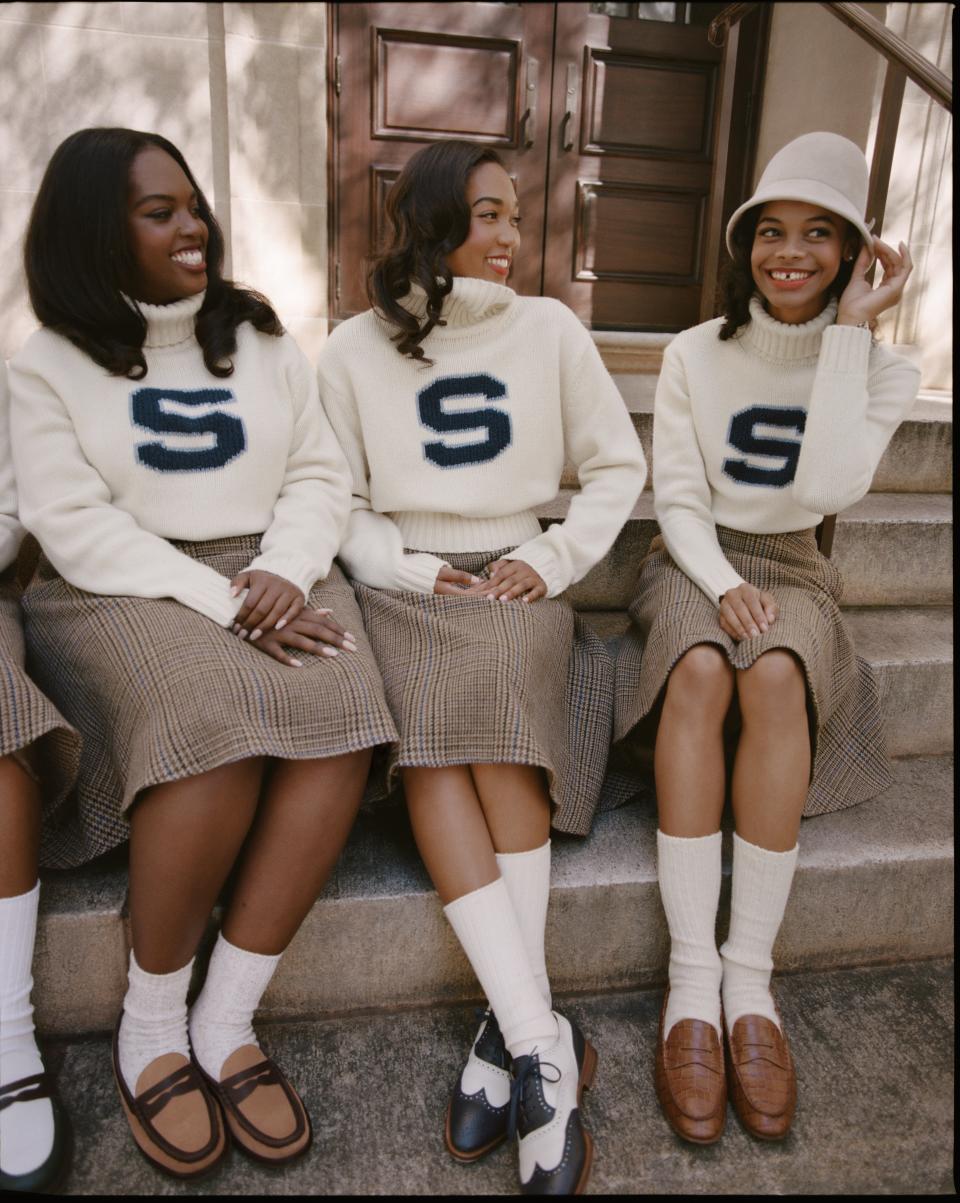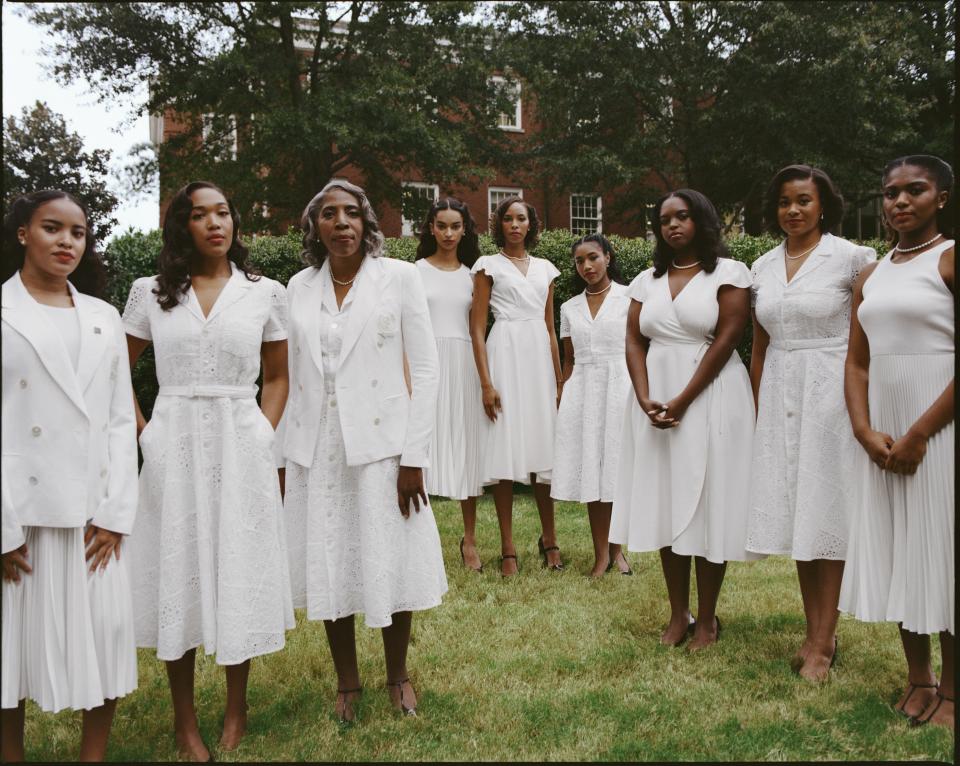Who Owns American Fashion? Ralph Lauren Undertakes a Mission to Highlight the Black Contribution

Polo Ralph Lauren’s newest tie-up with Morehouse College and Spelman College is working to bring a more inclusive answer to the question: who owns American style?
A capsule collection with the two HBCUs (Historically Black Colleges and Universities) drops later this month honoring the history and sartorial traditions of both institutes with an all-Black everything campaign: Ralph Lauren tapped Black creative directors, photographer, cinematographer and models (comprised largely of Morehouse and Spelman students) for the project.
More from WWD
Hubert de Givenchy's 1970s Black Cabine Models Made a Statement About Diversity
Ralph Lauren to Become Official Outfitter of the Australian Open
The line, an ode to 1920s to 1950s collegiate style, draws straight from the pages of the schools’ yearbooks and newsletters, archival images and mottos. And, perhaps even more importantly, it draws on the influence Black college students had in setting style trends.
“It was really important to steep this in history to show that this is not new,” James Jeter, Ralph Lauren director of concept design and special projects, Morehouse College alum (class of 2013) and brainchild behind the capsule, told WWD. “A lot of this project was really about changing ownership around how we think about clothing. So who owns three-piece suits? Who owns cable cardigans? Who owns the circle skirt, for instance? And while it’s typically and historically been relegated to Ivy League schools, if you see a lot of these archival images from [Morehouse and] Spelman, that has really helped to inform a lot of the way that we approached not only the design but the way that we approached the campaigns as well.”
Before mass production and well before collegiate style was attributed to an often un-inclusive elite, HBCU students were creating their own style, as Spelman College president Dr. Mary Schmidt Campbell said. (Both schools worked in tandem with Ralph Lauren designers on the capsule.)
“By sharing the early history of Spelman, as reflected in archival research, through clothing, the collection encourages conversations about the creative power of the Black experience and the ways in which a personal fashion aesthetic intersects with institutional values of solidarity and connection,” she said. “The history of dress and style played a critical role in the late 1950s and 1960s in the Civil Rights Movement. Students who sat at lunch tables, or who protested in front of segregated department stores or marched in protests always did so with deliberate and planned consciousness of their dress.”
Shot by fashion photographer Nadine Ijewere, the campaign looks like a fresh take on 1920s and ‘30s classics, with pieces in the collection including tweed three-piece suits designed in Italy with fabrics from London, boatneck sweaters emblazoned with an “M,” a double-breasted linen blazer with a Spelman crest and a formal look fitting for cotillion balls. Some sportswear styles are adorned with “67” on the back, an ideal synergy as Morehouse was founded in 1867 and Ralph Lauren in 1967. For the first time, the iconic Ralph Lauren Polo bear will be adorned in a Spelman-branded scarf.
But more than anything, the pieces have meaning.

Polo Ralph Lauren
The “S” on one of the Spelman sweatshirts was inspired by a typeface from a late 1800s/early 1900s version of the Spelman Messenger, a newsletter the college still circulates to date. And the white dresses draw on an age-old Spelman tradition.
“Since the inception of the institution in 1881, young women were instructed to bring a dress made of simple white cotton as a way to have something beautiful to wear on formal occasions and it’s a tradition that we continue to uphold,” said Dara Douglas, Ralph Lauren director of inspirational content and the Ralph Lauren Library — also a Spelman alum (class of 2003). “We wanted to pay homage to that tradition in creating these dresses.”
The capsule collection, which ranges in price from $20 to $2,500, will debut to Morehouse and Spelman students and faculty for a presale before being made available to global consumers on March 29. It will be accessible via the Ralph Lauren website, the Polo App, at Morehouse College and Spelman College Follett campus bookstores and in select stores while quantities last.
The collection, according to Douglas, “shows the depth and breadth of Black culture.”
“People conceptualize it as a monolith, so this helps to show those other images that…aren’t so prevalent in American culture and American society,” she said. “I think that this just shows how committed [Ralph Lauren is] to being able to expand the narrative of American style…who owns American style and what does that look like. Everybody should be able to be a part of that and see themselves reflected in that and I hope that it’s inspiring.”
Not capping things off with the clothing alone, Ralph Lauren will debut a commemorative yearbook featuring the significance, contribution and ethos of Morehouse and Spelman Colleges, as well as some of the archival images referenced in designing the collection. A 27-minute film titled “A Portrait of the American Dream,” bringing some of that sartorial history to life is also part of the campaign. The film will premiere on March 28 at 7:30 p.m. EDT on Ralph Lauren social channels and the yearbook will be available for digital viewing the following day.
Beyond the capsule, the Ralph Lauren Corporate Foundation pledged $2 million in December 2021 for scholarships for students at Morehouse College, Spelman College and 10 other HBCUs through the United Negro College Fund, and the company says it’s further developing internships, recruitment and mentorship in partnership with these institutions.
As he has invested in the community financially, Jeter said, “Ralph Lauren invested in this idea and empowered individuals from this community to tell this story. There wasn’t really micromanaging or this wasn’t Ralph’s version of it. These are stories from the community, from people that are a product of that community and a product of Ralph Lauren.”
As a page in the collection “yearbook” quoting Lauren reads, “Our portrait of American style and our vision of the American dream, would be incomplete without Black experiences like this.”

Polo Ralph Lauren
Best of WWD
Sign up for WWD's Newsletter. For the latest news, follow us on Twitter, Facebook, and Instagram.
